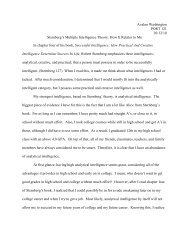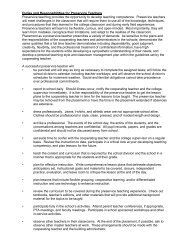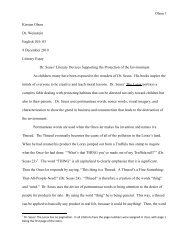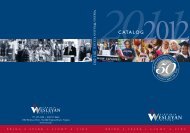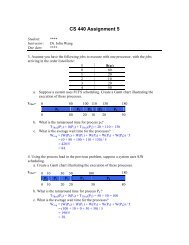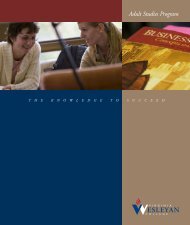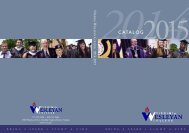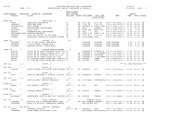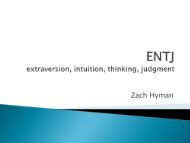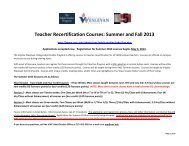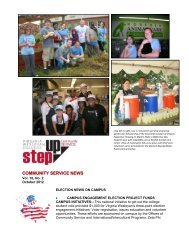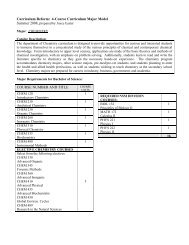2008-2009 Catalog - Virginia Wesleyan College
2008-2009 Catalog - Virginia Wesleyan College
2008-2009 Catalog - Virginia Wesleyan College
- No tags were found...
You also want an ePaper? Increase the reach of your titles
YUMPU automatically turns print PDFs into web optimized ePapers that Google loves.
112 HISTORYdefinition of Germany? Why have Germans historically hada strong sense of regional identity and a tenuous nationalallegiance? Is the Holocaust the main lens through whichone should read German history? Where are Germany’sborders? Prerequisite: sophomore/junior/senior status.Offered spring of even-numbered years.352 U.S.Women’s History (3) (H)Examines topics in the history of women in the UnitedStates from the colonial period to the present. The coursefocuses particularly on how women’s roles and ideas aboutfemininity changed over time in the context of the social,economic, political, and cultural development of theUnited States. The course also takes account of whatAmerican women have shared, as well as how they havediffered across lines of class, race, ethnicity and region.Prerequisite: sophomore/junior/senior status. Offeredspring of even-numbered years.353 History of Women inEurope Since 1700 (3)(H) WExplores the history of women in Europe from the 18thcentury to the present. Its central themes focus on women’sroles in society, both public and private. Examining womenin the spaces they have historically occupied, students probesome of the central questions concerning the history ofwomen in Europe: How did society define “woman,” andwhy was she generally seen as the “other”? How did societyconstruct women’s roles, and to what extent did womencontest traditional gender roles? How did industrializationshape women’s lives? To what extent did women participatein political struggle, and how did their political goals andmeans of struggle vary from those of men? How didcontemporaries view the female body? Why did somewomen oppose “emancipation,” as defined by feminists?Prerequisite: sophomore/junior/senior status. Offered fallof even-numbered years.360 Junior Research Seminar (3) WDesigned to provide history majors with skills forresearch within the discipline. Students examine a few basicreadings on the general topic together and then formulatetheir own related research projects. A series of assignmentstakes them through the research and writing process andculminates in a major paper. Prerequisites: declared majorin history, sophomore/junior/senior status. Offered eachspring.375 The History of Piracy (3)(Winter Session)Explores the world that pirates called their home,including both the myth and the reality of being a pirate.Topics include a pirate’s daily life, the reasons why someonewould become a pirate, and the relationship betweenpiracy and the construction of early modern empires.Comparisons with pirates in the South China Sea and thenorthern coast of Africa are also explored, and several filmsare screened. Prerequisite: sophomore/junior/senior status;must read Stevenson’s Treasure Island for first day of class.Offered in selected Winter Sessions.380 Dos Passos’ U.S.A (3) (H)(Winter Session)An intensive exploration of an underutilizedmasterpiece of American literature as well as a ruminationon the tenor of life, politics, culture, and history in theUnited States during the first three decades of the 20thcentury. The core of this seminar is John Dos Passos’ greattrilogy, U.S.A.: The 42nd Parallel: 1919: The Big Money.We read and discuss these fascinating and complicatedbooks, explore and evaluate Dos Passos’ innovativenarrative and experimental styles, his political agenda andsocial critique, his understanding of the flow of Americanhistory, his enduring appeal to the fan of a good read, andhis great utility to the student of American history. Usingthe books as a guide and a lodestar, we construct anunderstanding of the American experience before, duringand after the First World War, and gain a unique insightinto the connections between literature and history andbetween art and memory. Prerequisite: any 100-levelhistory course, sophomore/junior/senior status. Offered inselected Winter Sessions.381 The South of Erskine Caldwell (3)(Winter Session)An intensive reading and discussion seminar whichexplores the tenor of early 20th century Southern life andculture through the fiction and non-fiction works ofErskine Caldwell, a much-overlooked genius of Americanletters. Caldwell stands alongside William Faulkner as oneof the two most important interpreters of life, culture, andsociety in the South during the early 20th century. In hishighly readable works, Caldwell straddled the lines betweensharp social commentary and popular fiction, high art andreportage. By focusing on the lives of ordinary Southerners,Caldwell explored race, class, and gender in a Southwracked by industrialization, social upheaval, racialviolence, and the Great Depression. Rural Southern life, therace question in the South, radical Georgia politics, socialchange during the Great Depression, and the broader flowof events in American history between 1900 and 1945 arecovered along with other important topics. Prerequisite:sophomore/junior/senior status. Offered in selected WinterSessions.383 Banned Books and theLaw in American History (3)(Winter Session)Identical to ENG 383.(H)385 Seminar in the History of Socialism,Communism, and Marxism in Europe (3) (H)(Winter Session)Explores the development of socialism in Europe fromthe late eighteenth century through today. Examines thetheoretical origins of socialism in the late eighteenthcentury and the beginning of the nineteenth century.Includes an analysis of Marxism and Communism asdeveloped by Karl Marx and Friedrich Engels in the midnineteenthcentury, as well as critical socialist thinkers after



